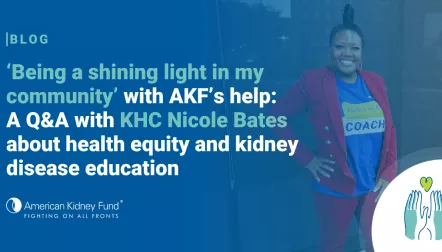
Blog post
Toward a level playing field: How a change to race-based eGFR calculations is increasing access to transplants among Black patients

A policy change aimed at improving kidney transplant equity has so far shortened the waitlist time for a lifesaving organ for more than 14,000 Black patients. Two of those patients, Charlotta T and Craig M., both diagnosed with kidney failure, recently shared their stories with us.
In July 2023, the Organ Procurement and Transplantation Network (OPTN) changed its policy to require that transplant centers use a race-neutral calculation to determine a transplant candidate's estimated glomerular filtration rate (eGFR). The policy requires transplant hospitals to use the same calculation for all kidney patients, instead of using a separate equation for black patients, which historically put Black kidney patients at a disadvantage by overestimating their kidney function. This made the kidneys look healthier than they really were and led to Black patients waiting longer for kidney transplants.
Craig said he felt immensely grateful to learn he'd be benefiting from the change. Diagnosed with stage three kidney disease at age 29, Craig said that once he had to go on dialysis, the experience was very difficult for him, as it took a toll on his body, mind and spirit.
"Your emotions and thought patterns are up and down, and you're hopeful one day and then the next day you feel like [a transplant] is not going to happen," Craig said. So, when he found out in early November 2023 that he was being credited for four years on the waitlist because the race-inclusive eGFR caused him to wait for longer than he should have had to wait, he was thrilled, as he had already been on the transplant waitlist for four years.
A couple of days later, Craig received a phone call that a kidney match had been found. But while he was happy to hear that we would be getting a new kidney, the news was bittersweet because the donor was brain dead, and he was just 35 years old. "My emotions immediately went to the donor's family," Craig said. "November is not only my birthday month, but it's also [the month of] Thanksgiving. I hated that for that family because that's one less person around the Thanksgiving Day table." Craig got his new kidney just before Thanksgiving, feeling deeply moved by the situation. "I'm a recipient of [my donor's] sacrifice, so that was very touching," he said.
Charlotta suffered from gradually declining kidney function for years. Like Craig, she was thrilled when her transplant coordinator told her that she would benefit from the policy update – only for her, the benefit was being put on the transplant waitlist in the first place. According to the coordinator, Charlotta should have been placed on the waitlist years earlier. She received nine years of credit from Yale New Haven Transplant Center and eight years from Hartford HealthCare.

Just three and a half weeks after getting on the waitlist, she received her first phone call with an offer for a new kidney. Unfortunately, Charlotta was in Ohio visiting family, and couldn't get back in time for the transplant surgery. However, she said the young man on the other end of the phone call kept her hope alive. "He said, 'You're at the top of the list and will probably get another offer this week,'" Charlotta said. "I held onto that because I needed it." The young man proved to be right, as Charlotta got another offer later that week. While that offer didn't pan out, Charlotta got another offer a couple of weeks later that she was able to accept, and she received her new kidney in September 2023 at Hartford HealthCare.
Getting a transplant marked a new beginning for Charlotta and Craig – a beginning that may not have happened for several more years had it not been for the OPTN policy update. "[This change] gives people opportunity," Charlotta said. "There's no way I would have gone on the transplant list at the top of the list and been there for only three and a half weeks had it not been for all the research and the work that went into the process of changing a bad system."
Craig said he thinks often about the people who are no longer with us because they had to wait longer than they should have to get a transplant. "They could have received a transplant a lot sooner, [but instead] they passed away because of this inequality," said Craig. "I'm very grateful for the change and for the individuals who led the charge and said, 'we have to change this.' I don't know the names of those individuals, but I believe I owe them something, so my fight and my mission is to educate and inspire and continue to share my story with others."
Still, even with the policy update, Charlotta said she recognizes that waiting for and receiving a transplant is not an easy experience. "I want other people to know that they can get through this process, but they have to advocate for themselves," she said. "They need to find those people who will support them and try to keep a positive attitude, because that can really help, and they have to remember that this is their journey right now, but it won't be their journey forever."
For information about kidney transplants, view our Transplant Toolkit.
Click here for more information about OPTN's policy change to a race neutral eGFR calculation.





